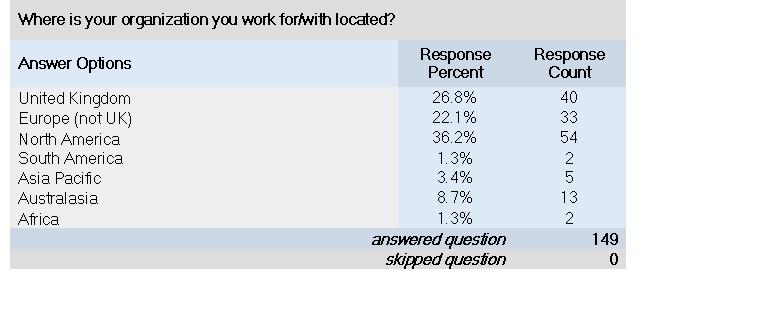From The Coal Face: Real World IT Service Management And ITIL Adoption Sound Bites
Remember 2011? It seems a long time ago already.
At the start of August, I wrote a speculative blog called Giving Back To The IT Service Management Community which was somewhat of a personal plea for anyone involved in IT operations, IT service delivery, IT support, etc. to “give back” to the larger community. This highlighted (or reminded us of) the need for the creation of lower-level, more granular, and ultimately more practical best practice information that is freely available to IT service management (ITSM) practitioners; as a quick start mechanism and/or to prevent the continued reinvention of the wheel by organizations wishing to better themselves. It all looked good with over three thousand unique views on the Forrester Blog site alone.
In late October (yes, I know I am slow), I published ITSM Practitioner Health Check: The ITSM Community Strikes Back with an associated survey hoping that hundreds if not thousands of ITSM practitioners would offer their views as to where we, as a community, need most help. The results?
ITSM Practitioner Health Check: initial results
Firstly, I need to temper my expectations: the survey was open for two months and plugged by many on Twitter and by organizations such as the itSMF UK, the SDI, and Hornbill but still only 149 people started the survey. Why did I say “started,” because only 76 completed the two “meaty” questions.
I have to take the blame for the drop off from 149 to 76 in thinking that the survey was easy and quick to complete, the drop off suggests otherwise. The fact that only 149 people started the survey is a different story that can speculated upon across a number of areas. I only hope that it is not indicative of what could be a different “community movement”: Taking, Taking, And Taking From The ITSM Community. In all seriousness though, I appreciate that we are all busy and that the reach of Twitter and my blog is extremely limited but I still expected more. Oh well, maybe I am more “glass half-full” than people expect.

Despite the low turnout, however, I do think that we have some interesting and valuable information across perceived ITSM process maturity and interest, and the top areas that require ITSM-related assistance. I’m not going to blurt that out today as I think it warrants the attention of a group rather than just myself. What I do want to initially share though are the “further comments” added to the tail end of the survey which I think are a great snapshot of “real world ITSM” in their own right.
Real world ITSM: a collection of ITSM practitioner comments
- “Frustrated that our company has spent £1000's on sending staff to ITIL Foundation training and thinks that was all that was required. Cannot get through to them the value of ITSM and why it could be of benefit to us, the customers AND have potential to save money.”
- “The interesting, typical "ITSM" stuff is lots of work, but relatively easy to get done. Getting those ideas, processes and procedures adopted organization-wide is the hard part.”
- “I was hoping that these things would have made up the complementary material as promised with the ITIL v3 release … sadly, there hasn't been much delivered by the OGC.”
- “The day to day activity does not allow the organization to take a breath and to change the way they are performing their tasks.”
- “My ITIL experience has provided me a great livelihood, and a real niche in the technical world. Most technicians in our area couldn’t care less about processes. I love it, and I am technical.”
- “Difficulties experienced are more cultural in nature at the highest levels of leadership in terms of support and sponsorship.”
- “More examples and templates for ITSM, especially in the ITIL publications.”
- “ITIL trainers are ruining it. Practicality please!”
- “We are struggling with poor/negligent management.”
- “We a team of three ITIL experts struggling to bring the good practices of ITIL to here in Company X.”
- “ITIL'ising a small IT department is a chore. Doing it at a large scale globally across multiple offices is like moving a mountain.”
- “Please, please remember to emphasise ITIL as a framework/guidance. It is not a substitute for the common sense or the application of relevant experience.”
- “Ownership of processes has been a vexing issue in our organization. We also see challenges in how service architecture works effectively with other elements of enterprise architecture and project management.”
- “We have many manual processes in place, but struggle with tooling solutions, and documentation efforts. Manual processes are hindered by organizational change, communication, and training challenges.”
So there you have it. Any thoughts or comments? How does it make you feel?
More to come soon and don’t worry, this is not an analysis exercise. We are committed to making a difference through the delivery of tangibles that will hopefully give back to the ITSM community.
UPDATE: Two popular ITIL-related blogs:
- http://blogs.forrester.com/stephen_mann/12-02-01-itil_adoption_5_steps_that_can_help_with_success
- http://blogs.forrester.com/stephen_mann/12-01-26-we_need_to_talk_about_itil
Related blogs:
- http://blogs.forrester.com/stephen_mann/11-08-26-top_20_ok_50_itil_adoption_mistakes
- http://blogs.forrester.com/stephen_mann/11-12-15-the_abc_of_ict_the_top_10_people_success_factors_for_it_service_management_0
- http://blogs.forrester.com/stephen_mann/11-08-04-giving_back_to_the_it_service_management_community
- http://blogs.forrester.com/stephen_mann/11-06-20-support_it_service_management_tool_vendors_that_support_the_itsm_community
- http://blogs.forrester.com/stephen_mann/11-12-16-top_10_it_service_management_challenges_for_2012_more_emphasis_on_the_service_and_the_management